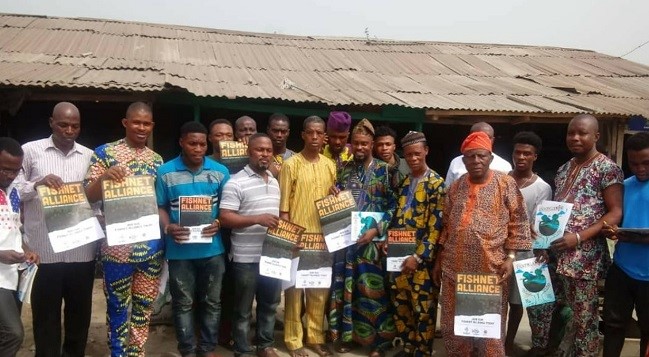Courtesy of the Health of Mother Earth Foundation (HOMEF) fishers in Nigeria and Togo met on December 28, 2018 in Makoko community, Lagos State, Nigeria. The meeting reportedly created space for exchange of information and ideas to ensure sustainable fishing and ensure that fishers’ rights are upheld and respected by policy makers.

The meeting hosted Adam Muhamadou Derman, the Secretary General of Fishermen Trade Union in Togo; who also doubles as the chairman of FishNet Alliance, Togo and leaders of fishing associations in Makoko. Apostle Akintimehin, one of the leaders of fishing associations in Makoko, thanked HOMEF for being always committed to the cause of fishers in Makoko and Nigeria at large.
While narrating the fishing practices in Togo, Adam said that there are federations of fishers in Togo which include: continental fishers (folks that fish in rivers, creek and other inland water) and oceanic fishers (folks that fish in seas, oceans etc.). He added that, at a time, a new fishing port was constructed in Lome by the Chinese without due consultations with the fishers – so the fishers were not involved in the construction. He stated that it would have been better if the fishers were consulted so they can decide how the port would be operated.
According to him, a time came when the fishers and trade union of fishers raised their voices because the construction activities were negatively impacting their fishing activities. A management committee was set up and fishers were incorporated into the management of the port, affording them the opportunities to be involved in decision making for the port operations and fishing in their region.
He added that monitoring of fishing activities was done by the government in the past, but now that there are professional fishing association associations.
“We are part of the monitoring and control team with government public administration. With the fishers’ involvement, they have put in place good fishing practices like fishing with small nets, fishing with generator, in which they go for fishing with generator and put light inside the water to attract fish,” he said.
While reiterating the stance of FishNet Alliance, he said that there is a sensitisation going on now to discourage fishers from using chemicals because some fishermen go to the sea with some chemicals and put them in the water to catch more fishes to have more money.
“We are currently dialoguing with them and informing them about the harm (both to the marine environment and to humans that consume the fishes and also our livelihoods) of using chemicals to fish, informing them that the chemical kills the fish, their eggs and other aquatic organisms. When this happen, they will not be able to reproduce and if this continues over some years; there will be no more fish in our water.”
He informed that they have gone a step ahead to ensure that the local knowledge is preserved for now and the future – so they organise workshops to train community fishers (both young and old) on sustainable local fishing techniques and resource management as a way of continuous reminder about their traditional methods of fishing that respects nature. He believes that by so doing, they are transferring the local knowledge to the future.
They expressed their readiness to uphold the tenets of the FishNet Alliance stating that the FishNet Alliance is the way to go and that it will help unite fishers in Africa and in other parts of the world.
The fishers from Makoko thanked him from coming all the way from Togo for a knowledge exchange and solidarity visit, stating that they face threats of displacement from their coastal environment due to dredging activities by the government, and that, secondly, fishing gears are expensive, and they do not enjoy any assistance from the government.
Participants opined that the problems faced by coastal communities are similar in nature, yet the authorities involved are not taking the plight of the fishers in coastal areas into consideration, even when the fact is clear that the sector employs more people than the oil and mining sectors.
With the FishNet Alliance, the fishers in coastal regions in Nigeria, Togo and Ghana believe that they now have leverage and a platform to express themselves and share their experiences and issues with other fisher folks across the coast of West Africa.
The platform brings about collective efforts in putting a stop to the activities of the explorative and extractive industries across Nigeria and the coast of West Africa, the fishers stressed.
The fishers from Lome and Makoko agreed that since exploration for hydrocarbons is ongoing along the entire coastline of West Africa, it is essential that the FishNet network expands to more countries and that fishers are trained to monitor the marine ecosystem in their territories.
By Stephen Oduware (Project Officer, Sustainability Academy, HOMEF)
